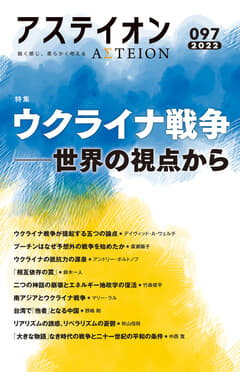Publications
The Hiroshima G7 Summit and Nuclear Disarmament: Essential talks were held, but more is now needed
AbstractOn May 23, 2023, The Diplomat published an article authored by Professor Nobumasa Akiyama, Dean of the School of International and Public Policy, Professor at the Graduate School of Law, and a GGR Researcher, titled “The Hiroshima G7 Summit and Nuclear Disarmament: Essential talks were held, but more is now needed.“ Professor Akiyama discusses the position of the G-7 Leaders’ Hiroshima Vision for Nuclear Disarmament" presented at the G7 Hiroshima Summit and the significance of the G7 leaders standing in the A-bombed city. Professor Akiyama evaluated the significance of holding the summit in Hiroshima, given that Prime Minister Kishida has made nuclear disarmament his life work. The professor also noted that the "Hiroshima Vision" puts nuclear disarmament at the forefront even amidst the difficult international environment and that it not only conforms to existing frameworks but also sets out new initiatives regarding transparency, for instance. Finally, the professor emphasized the role of the G7 in global governance and a world without nuclear weapons and said that the international community should use this summit as a springboard to implement more substantial measures.
Hiroshima Vision for G7 Nuclear Disarmament: Respect for Dialogue among Different Stance – Nobumasa Akiyama, Professor, Hitotsubashi University [in Japanese]
AbstractOn May 21, 2023, Tokyo Shimbun introduced an article that interviewed Professor Nobumasa Akiyama, Dean of School of International and Public Policy, Professor at Graduate School of Law, and GGR Researcher, titled “Hiroshima Vision for G7 Nuclear Disarmament: Respect for Dialogue among Different Stance - Nobumasa Akiyama, Professor, Hitotsubashi University.“ The article outlines the discussions on nuclear disarmament at the G7 Hiroshima Summit. Professor Akiyama explains that it is important that not only the seven G7 states, but also invited states and international organizations jointly demonstrate their stance on nuclear disarmament. The professor also pointed out the significance of G7 leaders acknowledging the reality of nuclear exposure amid the current security environment. Finally, the professor said that the Leaders' Statement and the Hiroshima Vision confirmed the adherence to Treaty on the Non-Proliferation of Nuclear Weapons regime, and argued that, while further cooperative measures are required, respecting the forum for dialogue among countries with different positions is the way to approach a world without nuclear weapons.
World Without Nuclear Weapons, However Long It May Take: Expectations of Japanese Researcher for the Hiroshima Summit [in Japanese]
AbstractOn May 18, 2023, Asahi Shimbun introduced an article that interviewed Professor Nobumasa Akiyama, Dean of School of International and Public Policy, Professor at Graduate School of Law, and GGR Researcher, titled “World Without Nuclear Weapons, However Long It May Take: Expectations of Japanese Researcher for the Hiroshima Summit.“ In this article, Professor Akiyama discussed what the G7 should voice toward "a world without nuclear weapons.” First, Professor Akiyama argued that, based on rising tensions among the major powers and in the region, there will probably be virtually no linear progress toward “a world without nuclear weapons.” The professor then stated that building a track record of nuclear weapons not being ultimately used under any circumstances is important for achieving “a world without nuclear weapons,” even though it may seem like a slow and roundabout way to go. The professor stressed the importance of bridging the gap in perceptions of nuclear weapons due to the different geopolitical risks that countries face to strengthen cooperation between emerging and developing countries in the nuclear field. In addition, regarding China's nuclear weapons, the professor explained that the lack of disclosure of nuclear-related information has created a major transparency problem.
Emerging Strategic Risks in the Asia-Pacific and the Impact on the Nuclear Non-proliferation Regime: The Japanese Perspective
AbstractOn March 6, 2023, the Asia-Pacific Leadership Network(ALPN)published the report “Emerging strategic risks in the Asia-Pacific and the impact on the nuclear non-proliferation regime: The Japanese perspective,” written by Professor Nobumasa Akiyama, dean of Hitotsubashi University School of International and Public Policy and GGR researcher. ALPN is a network of former and currently serving political, diplomatic, and military leaders, as well as scholars and opinion leaders based in the Asia-Pacific region. Their ultimate aim is to eliminate the usage of nuclear weapons and they do so by informing and influencing public opinion to take into consideration the threat that nuclear weapons pose to this world. Professor Akiyama, as a member of the ALPN, wrote this report with the purpose of explaining the current nuclear situation in the Asia-Pacific from the perspective of Japan.
Withdrawal or Continuation of the New START Treaty: Putin Troubled and the U.S. Administration Put to the Test [in Japanese]
AbstractOn February 23, 2023, Asahi Shimbun published the interview “Withdrawal or Continuation of the New START Treaty: Putin Troubled and the U.S. Administration Put to the Test” with Professor Nobumasa Akiyama, Dean of Hitotsubashi University’s School of International and Public Policy and GGR researcher. This article was published immediately after Russia’s decision to suspend the New Strategic Arms Reduction Treaty (New START) and U.S. President Biden’s surprise visit to the Ukrainian capital, Kyiv. Professor Akiyama commented on how he perceives Russia’s decision and why Putin acted the way he did in light of the approaching one-year anniversary of Ukraine’s invasion. Furthermore, he indicated that this could cause a political division within the U.S. as Russia’s suspension challenges the Biden administration’s agenda of disarmament. Professor Akiyama concluded on the note that further negotiations to renew the treaty could stall and further scrutinization on how the US reacts to this situation is necessary.
Russia’s New START Statement “Highly Political” [in Japanese]
AbstractOn February 22, 2023, Mainichi Shimbun published the interview “Russia’s New START Statement ‘Highly Political’” with Professor Nobumasa Akiyama, Dean of Hitotsubashi University’s School of International and Public Policy and GGR researcher. In the interview, Professor Akiyama explained how the recent statement by President Putin regarding the New START treaty does not drastically change the current situation. Rather, he described it as being a “highly political” move by Putin who felt it necessary to send a strong message to the world in wake of President Biden’s unexpected visit to Ukraine and the one-year anniversary of Russia’s invasion. Professor Akiyama suggested that Putin’s aim might be to sway the political sphere within the U.S. by creating a conflict between those who support the New START treaty and those who advocate for a withdrawal from it. In any case, recent tensions have made further negotiations for a successor treaty difficult and pose a major threat to further disarmament movements in the global community.
Beyond a World “Accustomed” to Nuclear Threats: Contradictions and Dilemmas Awaiting on the Way Out of the Invasion [in Japanese]
AbstractOn February 20, 2023, Asahi Shimbun published the interview “Beyond a World ‘Accustomed’ to Nuclear Threats: Contradictions and Dilemmas Awaiting a Way Out of the Invasion” with Professor Nobumasa Akiyama, Dean of Hitotsubashi University School of International and Public Policy and GGR researcher. In the interview, Professor Akiyama indicated the dangers of the international society becoming accustomed to Putin’s threats of nuclear weapons usage. Downplaying such threats could lead Russia to become more aggressive and cause an unexpected turn of events in the war. However, the professor also stated that there is no easy way out of this situation as there are several dilemmas that come into play. While the best-case scenario is that Russia surrenders without using nuclear weapons, there is a need to consider other possible outcomes. Furthermore, to realize a world without nuclear weapons, Professor Akiyama insisted that the international community should not only talk about the idea of nuclear abolition, but also share ideas on what means are necessary to realize this idea and work toward an agreement. In the end, he discussed how such discussions and recognition of the world structure would lead to the conception of a "postwar" international order.
The Temptation of Realism and the Melancholy of Liberalism: Questioning the Role of Nuclear Technology [in Japanese]
AbstractOn November 18, 2022, Asteion, a magazine that analyzes various issues around the world, released its latest issue, featuring the Russo-Ukrainian War, in which Professor Akiyama’s article was published. Following Russia's invasion of Ukraine, countless discussions about the use as well as the role of nuclear weapons unfolded. In his article, Professor Akiyama first provides a framework for considering the impact of possessing nuclear weapons in wartime, and based on this, he examines the utilization of nuclear power in Russia's invasion of Ukraine. The professor points out that Russia has repeatedly sent signals that made the US and Europe strongly aware of the presence of nuclear weapons, and argues that this signaling had, to some extent, deterred the US and Europe from taking action. At the same time, however, he explains that the "stability/instability paradox" created by Russia has also served as a deterrent to its own actions. The professor then describes the impact that the war in Ukraine has had on the nuclear arms control regime, and outlines the long-term consequences on the international order that the actions of both the United States and Russia have caused. One of these effects has been the preservation of a realist balance-of-power type order within the liberal international order. He also points out how relative the discussion of "justice" regarding nuclear weapons is, considering each country's stance towards the TPNW, and emphasizes that nuclear weapons are viewed with a "double standard." Finally, the professor argues that in addition to the U.S.-Russia conflict, tensions are also rising between the U.S. and China, and that as the impact of nuclear weapons escalates, rules should be provided to protect the competition and confrontation between the U.S., Russia, and China.
Prime Minister Kishida’s “Ideal” and “Reality”: How should we think about a world without nuclear weapons? [in Japanese]
AbstractOn December 1, 2022, an article of an interview with Professor Nobumasa Akiyama, Dean of the School of International and Public Policy at Hitotsubashi University, was published in Asahi Shimbun's “Considering the Future of the Security Treaty” interview series. Professor Akiyama praised Prime Minister Kishida for attending the Nuclear Non-proliferation Treaty (NPT) Review Conference but noted that further contributions by Japan are necessary in the pursuit of nuclear disarmament. In particular, he discussed how Japan should act to achieve nuclear disarmament in the face of Russia's nuclear threat to Ukraine, which has made a “world without nuclear weapons” seemingly far off in the future. Furthermore, Professor Akiyama expressed his views on how to link the “ideal” of a nuclear-free world and the “reality” of a deteriorating security environment. He then proposed goals on nuclear issues that Japan should pursue in the international conferences to be held in the country in the future.
Japan’s Dilemma: Relying on Nuclear Deterrence while Advocating Nuclear Abolition [in Japanese]
AbstractWith the use of nuclear weapons by Russia becoming increasingly realistic, Professor Nobumasa Akiyama explained the use of nuclear weapons from a legal perspective and suggested what kinds of actions Japan should take toward nuclear disarmament and abolition. Regarding Russia's words and actions over nuclear weapons in the Russo-Ukrainian War, Professor Akiyama noted that while the use of nuclear weapons itself is not legally prohibited, Russia's actions have reinforced both the calls for nuclear deterrence and nuclear abolition. He also argued that it is important for Japan, which will host the G7 summit next May, to provide a forum for discussing nuclear weapons in order to build a world that does not depend on nuclear weapons. Moreover, the professor said that Japan should make accession to the Treaty on the Prohibition of Nuclear Weapons its ultimate goal, however, it is necessary to work carefully and steadily to establish Northeast Asia as a nuclear-free region. Finally, in light of the developments among nations at the NPT Review Conference held in late August, he reiterated the significance of an international conference where all states can come together to discuss nuclear abolition.



